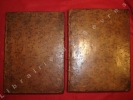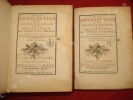BLONDEL (Jacques-François)
De la Distribution des maisons de Plaisance et de la Décoration des édifices en général (...)
1737 Paris, Charles-Antoine Jombert, 1737, 2 tomes en en 2 vol. in 4 de (8)-198 pp.+ 44 pl. gravées hors texte dont 42 dépl., VII-(1)-180 pp. + 112 planches gravées hors-texte dont 12 dépl., rel. d'ép. plein veau brun granité, dos (habilement refaits) à nerfs ornés de fers dorés, pièces de titres et de tomaisons de chagrin rouge, étui, le front. gravé manque, sinon bel ex.
Reference : 12965
Éd. orig. illustrée de 156 planches dessinées et gravées par l'auteur, fleurons de Cochin, vignettes et culs-de-lampe. "J.-F. BLONDEL (1705-1774), neveu de l'architecte François Blondel (Rouen 1683-Paris 1756), fonda à Paris sa propre école d'architecture, puis devint professeur à l'Académie royale (1756). Il travailla à l'embellissement de Metz (1764), mais est surtout connu pour ses écrits, dont l'Architecture française (1752-1756) et le Cours d'architecture civile (1771-1777), qui servit aux étudiants jusqu'à la fin du XIXesiècle." (Larousse).
Bookseller's contact details
Fronhofer Schlösschen Galerie
M. Bernard Esposito
Kreuzstrasse 3
97775 Burgsinn
Germany
+49 9356 6034856
Payment mode

Sale conditions
envoi des livres à réception du règlement virement bancaire, PayPal.
5 book(s) with the same title
De la Distribution des Maisons de Plaisance et de la Décoration des Edifices en general. 2 vols. [On the Designing of Country Seats and the Decoration of Buildings in General]. - [THE PEAK OF ARCHITECTURE]
Paris, Charles-Antoine Jambert, 1737-38. 4to. Bound in 2 cont. full calf. 5 raised bands, richly gilt compartments. Title-and tomelabels in leather on back. Bindings with light wear to hinges, so that the cords are occasionally showing, and some cracking of leather at upper and lower compartment, but binding tight. A little wear to spine ends, otherwise fine. Half-title, engraved frontispiece (by Cochin), title ind red/black, (6) pp. (= dedication a Monsieur Turgot),XVI,198,(1) (Errata leaf) " VIII,180 pp. Volume one having 44 fine engraved plates (42 double-or triple-page, 2 single-page) and 9 engraved head- and tail-pieces. Volume two having 112 fine engraved plates (numb. 1-99, no. 25 omitted and 13 with double- or triple numbering) and 3 head- and tail-pieces. Most of the plates drawn and engraved by Blondel. All text-pages printed within a borderline. On good thick paper, fresh and clean.
First edition, first issue (errata leaf and ""Rue St. Jacques"" for the printer on title) of Blondel's main architectural work, his monumental four-volume encyclopaedia of French buildings, which also constitutes his first work. The work is one of the most influential architectural treatises of the eighteenth century, as well as being one of the most comprehensive, beautiful and celebrated architectural works of the Rococco-period.Jacques-François Blondel (1705-74) is considered the most significant French architectural educator of the eighteenth century. After having produced his first work, the seminal ""De la Distribution..."" at the age of 33, Blodel was so admired that he was asked to produce engravings for the festival book commemorating the celebration of the wedding of Madame Elizabeth of France to Dom Philippe of Spain. In 1740 he opened the ""Ecole des Arts"" with his architectural courses and became one of the earliest founders of schools of architecture in France, for which he was distinguished by the French Academy. Both through these couses and his works, he greatly influenced many later architects, such as Brongniart, Chalgrin, Desprez, Rondelet, as well as many other Europeans, who took Neoclassicism back with them from Paris. In 1755 he was inducted into the Académie Archtecture and he was appointed architect to Louis XV. He also contributed to the great Éncyclopédie of Diderot and d'Alembert.The first volume of his main work deals with the design of houses, the second with exterior ornamentation and interior designs and lay-out of gardens. Brunet I:977" Cohen-Ricci: 156-57.
De la distribution des maisons de plaisance, et de la décoration des édifices en général - TOME PREMIER SEUL - à Paris, rue Dauphine, chez Charles-Antoine Jombert, libraire du Roy pour l'artillerie & le génie, à l'Image Notre-Dame 1737
in-4 relié plein veau époque, dos à nerfs, ornés avec pièces de titre, tranches marbrées frontispice, planches dont certaines dépliantes. Volume complet.
coins et coiffes usées, intérieur complet et propre - DECORATION - ARCHITECTURE - GRAND SIECLE - VERSAILLES
De la Distribution des Maisons de Plaisance et de la Décoration des Edifices en general. Ouvrage enrichie de cent soixante Planches en taille-douce, gravées par l'Auteur. 2 Vols.
Paris, Charles-Antoine Jambert, 1737-38. 4to. Bound in 2 cont. full mottled calf. 6 raised bands, richly gilt spines. Titlelabels with gilt lettering. Gilt borders on covers. A paperlabel pasted on upper compartment. Stamps on foot of title-pages. Engraved frontispiece (by Cochin), title ind red/black, (6) pp. (= dedication a Monsieur Turgot), XVI,198" VII,(3) ,180,(2 - errata) pp. Volume one having 44 fine engraved plates (42 double-or triple-page, 2 single-page) and 9 engraved head- and tail-pieces. Volume two having 108 fine engraved plates (numb. 1-98, nos. 23, 24, 99 lacks, no 25 omitted and 13 with double- or triple numbering) and 3 head- and tail-pieces. Most of the plates drawn and engraved by Blondel. All text-pages printed within a borderline. Light toning to inner margins in volume one.On good thick paper, fresh and clean.
First edition, first issue (errata leaf and ""Rue St. Jacques"" for the printer on title) of Blondel's main architectural work, his monumental four-volume encyclopaedia of French buildings, which also constitutes his first work. The work is one of the most influential architectural treatises of the eighteenth century, as well as being one of the most comprehensive, beautiful and celebrated architectural works of the Rococco-period.Jacques-François Blondel (1705-74) is considered the most significant French architectural educator of the eighteenth century. After having produced his first work, the seminal ""De la Distribution..."" at the age of 33, Blodel was so admired that he was asked to produce engravings for the festival book commemorating the celebration of the wedding of Madame Elizabeth of France to Dom Philippe of Spain. In 1740 he opened the ""Ecole des Arts"" with his architectural courses and became one of the earliest founders of schools of architecture in France, for which he was distinguished by the French Academy. Both through these couses and his works, he greatly influenced many later architects, such as Brongniart, Chalgrin, Desprez, Rondelet, as well as many other Europeans, who took Neoclassicism back with them from Paris. In 1755 he was inducted into the Académie Archtecture and he was appointed architect to Louis XV. He also contributed to the great Éncyclopédie of Diderot and d'Alembert.The first volume of his main work deals with the design of houses, the second with exterior ornamentation and interior designs and lay-out of gardens. Brunet I:977" Cohen-Ricci: 156-57.
De la distribution des maisons de plaisance et de la décoration des édifices en général.
Paris, Charles-Antoine Jombert, 1737-1738. 2 volumes in-4° de [10]-XVI-198-[2]; VI-[1]-180 pages plein veau havane moucheté de noir, dos à nerfs aux filets estampés à froid, pièce de titre et de tomaison en maroquin rouge, superlibris "Le Duc de Nivernois" frappé aux plats, double filet doré aux coupes, roulette dorée aux chasses, tranches rouges.
Orné d'un frontispice, de vignettes en-tête, culs-de-lampe et lettrines gravée ainsi que d'une riche documentation de 155 planches hors texte, la majorité dépliante, représentant des façades, coupes et perspectives architecturales, ainsi que des jardins et des fontaines, et de nombreux éléments d’ornementation... Dessinées et en partie gravées par Blondel lui-même. Édition originale de ce très beau manuel que l'auteur destinait aux financiers et aux nobles. C'est en quelque sorte l'idéal du château français de style Louis XV. Blondel y développe des programmes parmi lesquels le lecteur choisi selon sa fortune. Jacques-François Blondel fut l'un des grand théoriciens de l'art de bâtir au XVIIIème siècle, grâce à son école d'architecture et à ses fameuses publications: Architecture française publiée en 1752 et son Cours d'architecture civile. Notre exemplaire fut celui de Louis-Jules Mancini-Mazarin, duc de Nivernais (1716-1798), pair de France, qui fut ministre d’État sous Louis XVI. Membre de l'Académie française, il fut un protecteur des lettres et fréquenta les grands noms de la France des Lumières tel que Duclos, le cardinal de Bernis, le maréchal de Noailles, Montesquieu et Mirabeau père. Il continua d'écrire tout au long de sa vie même lors de son emprisonnement aux Carmes sous la Terreur. Ex-libris d'Albert Laprade, célèbre architecte français qui fut Inspecteur général des Beaux-Arts de 1932 à 1951 et architecte en chef des bâtiment civiles et palais nationaux de 1932 à 1960; ex-libris de Jean-François Chaponnière.Les mors et les coiffes ont été renouvelés, quelques défauts d'usage à la reliure. La page de titre et une gravure dans le 1er volume (p.119) ont une petite réparation ancienne; six feuillets du second volume ont une pâle auréole d'humidité en tête. Quelques feuillets de textes légèrement brunis. Brunet 977; Graese, I, 441; Fowler & Baer, 50 ; Katalog Berlin, 2410 ; Millard, I, 25 ; Gallet (M.), Les Architectes parisiens du XVIIIe siècle, pp. 65-70.
Intérieurs d'appartements Styles Louis XIV, Louis XV, Louis XVI. Extraits de la distribution des maisons de plaisance et de la décoration des édifices en général. Par Jacques François Blondel.
Paris Armand Guérinet sd (début XXe).Page de titre et 60 planches libres en hélio. (43 X 32 cm). Sous chemise cartonnée à lacets moderne
Avec Les grilles de Nancy, par Lamour. Décorations intérieures par Pineau, d'Aviler, Roubo,Decker, Le Canu, Jeanneret. Le château de Versailles, par Le Brun.
 Write to the booksellers
Write to the booksellers







